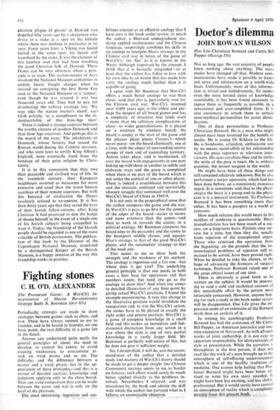Doctor's dilemma
JOHN ROWAN WILSON
One Life Christiaan Barnard and Curtis Bill Pepper (Harrap 55s)
Not so long ago, the vast majority of people knew nothing about anything. The mass media have changed all that. Modern com- munications have made it possible to trans- mit news and information on a world-wide basis. Unfortunately, most of this informa- tion is trivial and melodramatic. To render even the most limited items of knowledge assimilable, it has been found necessary to repeat them as frequently as possible, in a sensational and over-simplified form. It is also customary to attach them to certain semi-mythical personalities for easier identi- fication.
One of these personalities is Professor Christiaan Barnard. He is a man who might almost have been invented for the benefit of media. He is young Dr Kildare to the life. He is handsome, articulate, enthusiastic and by no means stand-offish in his relationship with the press reporters or television inter- viewers. His eyes are china-blue and he smiles the smile of the pure in heart. He is, without question, the sexiest surgeon in the world.
He might have been all these things and still remained relatively unknown. But he also performed a major operation, which had not been done before, on a notoriously evocative organ. It is sometimes said that to the physi- ologist the heart is a pump and to the physi- cian it is a musical instrument. To Professor Barnard it has been something more than either. It has been a passport to a world of romance.
How much relation this world bears to the realities of medicine is questionable. -Heart transplantation has not been much of a suc- cess, on a long-term basis. Patients may sur- vive for a time, but then they die, usually from rejection of the transplanted organ. Those who criticised the operation from the beginning, on the grounds that the im- munological problems of rejection still re- mained to be solved, have been proved right. When he decided to take the chance, in the hope of advancing the frontiers of surgical technique, Professor Barnard raised one of the great ethical issues of our time.
There is obviously a good book to be written on the subject. It would be interest- ing to read a cold and analytical account of this remarkable affair by the person most intimately concerned. However, anyone hop- ing for such a study in the book under review will be disappointed. One Life gives the im- pression more of an extension of the Barnard myth than an analysis of it.
In writing his autobiography Professor Barnard has had the assistance of Mr Curtis Bill Pepper, an American journalist and one- time executive of Newsweek. As with all such works of joint authorship, it is not easy to apportion responsibility for idiosyncrasies of style or presentation. While the narrative is throughout in the first person, it does not read like the work of a man brought up in the atmosphere of self-effacing understatement which is one of the healthy traditions of medicine. One cannot help feeling that Pro- fessor Barnard might have been better ad- vised to write his own story unaided. It might have been less exciting, and less slickly professional. But it would surely have carried an atmosphere of reality which is completely P'14itlaill this Pre*4-bealril


































 Previous page
Previous page